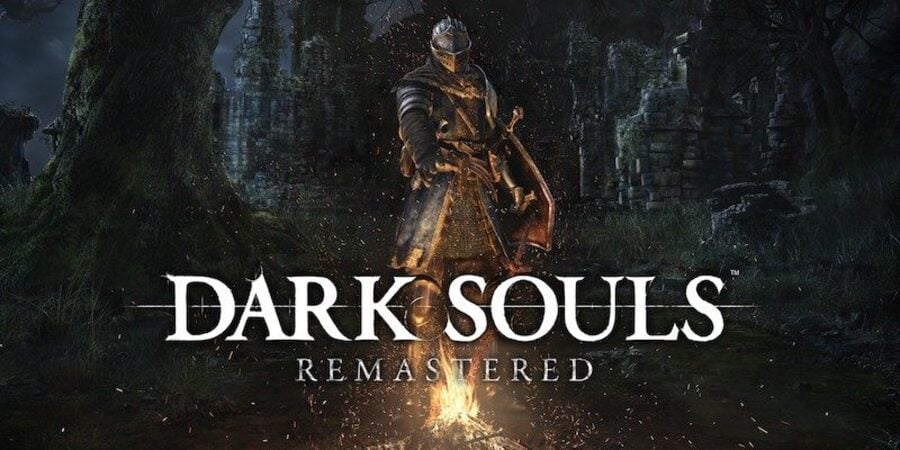
In case you haven't heard it countless times already, Dark Souls is hard. That doesn't change no matter how many times you hear the phrase "git gud". You can rest assured though that it is achievable, and that a lot of the frustration and difficulty stems from you being, pardon our pun, left in the dark.
By that, we mean that a bunch of systems integral to the experience aren't explained at all. So in this guide, we're going to walk you through a bunch of things we wish we'd known before we started. Basically, we've made all of the mistakes for you, so you can swan in, own a few bosses, and move on to the rest of this excellent series.
We'll aim to avoid spoilers as much as possible, but by nature of being a guide we may spoil something you didn't even know you cared about. So bear that in mind before you read on.
And then there was fire...
Dodge when the attack lands, not when the swing starts
Dodging (circle) in Dark Souls is a far cry from action RPGs like The Witcher 3: Wild Hunt or Monster Hunter: World. In other games you'll dodge to get out of the way of an attack well before it lands, but in Dark Souls you have to dodge the actual blow. By that, we mean dodge the moment a massive club is about to smash your face in.
It can feel very daunting at first, and you might instead use dodge and back well off from an enemy before they even attack. You'll do yourself a disservice though, because smart dodging can open up an opponent for a sweet counter attack from behind. That's right, dodging is used as much for attacking as it is for defending.
Also, just to be clear, you have a super small moment of invulnerability while dodging, which allows you to safely get out of the way of an attack even if it looks like it'll hit you.
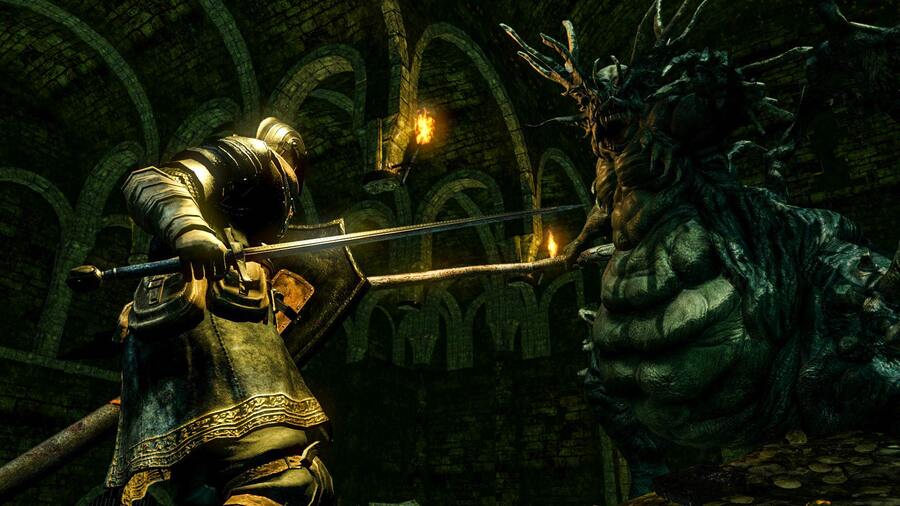
Learn to parry
Parrying (L2) is an incredibly useful skill that can make short work of even the toughest enemies, and it's not as difficult to pull off as you might think. It works much the same as dodging – parry at the exact moment an attack is about to land and you'll not only receive no damage, but your opponent will be wide open for an extremely damaging counter attack.
Undead Burg is a great area to practice parrying, because it's full of hollow knights that pull off relatively slow attacks. We recommend spending some time here early in the game to practice your timing.
Backstabbing is super powerful
Another useful skill that is actually taught is backstabbing, and it's easy to pull off. Simply walk slowly towards an enemy from behind and press R1 to deal a ridiculously powerful attack that may even kill them in a single blow. Be careful though – not all enemies are as dumb as they look, and some will hear you coming better than others.
Hold your shield up while exploring new areas
A simple tip, but a useful one – hold up your shield (L1) while you're exploring new areas. There are so many dangers in Dark Souls, but a ton of them can be entirely mitigated by your shield. It doesn't cost you anything to hold it up either, unless you block an attack. You'll be happy about that.
Ideally, you want a fast or medium roll
Equipping heavy armour is absolutely worthwhile, as you'll take far less damage when being attacked by an enemy. But what's better than taking less damage? That's right – no damage at all.
The best way to mitigate damage in Dark Souls is to not get hit at all, and you can achieve that by dodging. Now, depending on your equip load, you'll dodge at various different speeds. If your equipment load is below 25% of your maximum equip load, you'll roll fast. Below 50% but higher than 25%, you'll do a medium roll. And 50% and higher, you'll perform a slow roll.
Both fast and medium rolls have the same number of invincibility frames (as in, the amount of time where you're invincible), but medium rolls will recover slightly slower (it will take a bit more time before you can perform another action). Slow rolls have a much smaller invincibility frame and take a lot longer to recover from, so we'd strongly recommend against using equipment that puts you at this disadvantage.
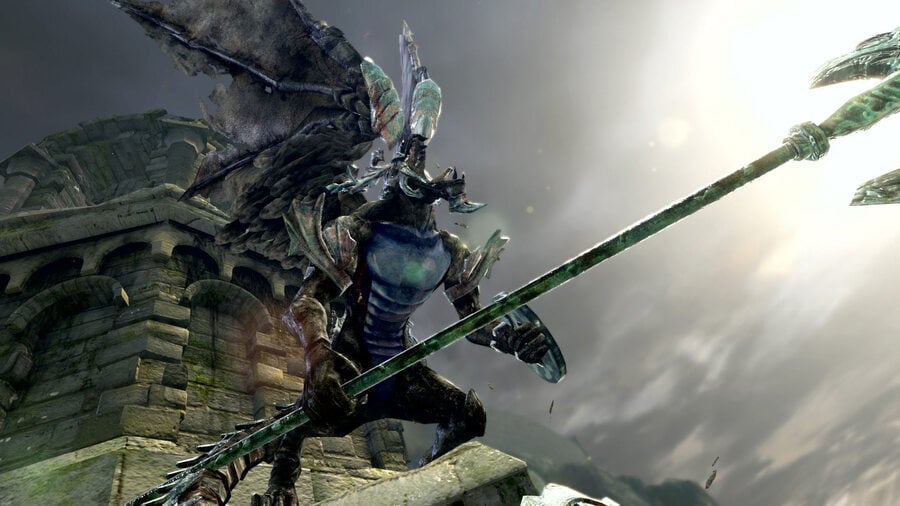
You can boost your maximum equipment load by putting points into endurance and equipping specific items in the game.
Never underestimate an enemy – even a rat
Seriously, there's no such thing as an easy enemy in Dark Souls. Sure, you might get to a point where you feel like a god and smash through everything, but one simple mistake can really punish you.
Rats, for example, aren't the simple opening enemy as in most RPGs. They've made short work of us on many occasions, because they can poison you with as little as two attacks. Just don't underestimate any opponent and you'll walk away laughing more often than not.
Be wary of walls when attacking
We can't count the number of times we've went in for the killing blow against an enemy, only to find our sword rebound off a nearby wall, opening us up for a nasty attack. While in tight spaces, it might be worth parrying, using a power attack, or switching to another weapon entirely.
Don't rely on a single weapon
On that note, we also recommend that you don't rely on a single weapon to make it through the game. Sure, you can use your two handed sword 90% of the time, but there are certain situations that might require something different.
For example, tight spaces might require a halberd, or you might want to take out inaccessible enemies with a bow. Certain enemies attack really slowly too, so you might want something a little faster than your massive sword to finish them off with. Make sure you have plenty of options on hand at all times.
Use equipment for the task ahead
As you explore the terrifying world of Dark Souls, you'll pick up a bunch of equipment like shields, weapons, armour, and restorative items. Have a glance at the properties of all of these items and make a mental note of their strengths.

Most items will come in handy at some point. While most enemies will attack you with physical damage, so wearing the armour with the highest physical defence score you can equip is recommended, there are times when this will change.
Enemies might throw fire and lightning at you, or try and poison you. In these instances, we strongly recommend switching to gear that has a high resistance to these types of damage, as they'll help way more than your big suit of armour. The same goes for shields – if enemies are throwing lightning at you, equip the shield with the highest lightning defence and you'll be laughing.
Solaire is your new best friend
There's a reason Solaire is so popular – if you're nice to him when you first meet him you can summon him to help you during boss battles. This can be an absolute godsend when you're really struggling, as he can distract bosses just long enough for you to get in the killer blow.
Spoiler alert: you'll meet Solaire just after killing the Taurus Demon in Undead Burg, in a passageway to the right of the dragon. Talk to him twice and say yes when both prompts appear to unlock him as an assistant during bosses.
The environment (and other players) can warn you about what's to come
You need all of the help you can get during a first run of Dark Souls, so pay very close attention to the environment as it can teach you a lot about what's to come. Lots of sooty dents on the ground? Keep away, as explosions are coming. Scratches on the floor? Likely a boulder, so tread carefully.
The same goes for bloodstains and hints from other players. Lots of bloodstains mean a ton of players have died in the area, so chances are it's pretty difficult. Be on your guard here. Also, read all fiery writing on the ground for clues about what's to come, but glance at the ratings because this can tell you how trustworthy that particular note is.
You have to rest at bonfires to return to them when you (inevitably) die
This is a simple tip but it can prove frustrating if you don't follow it. Put simply, lighting a bonfire doesn't set it as the place you return to when you die. No, you actually have to rest at one to trigger it as your respawn location.
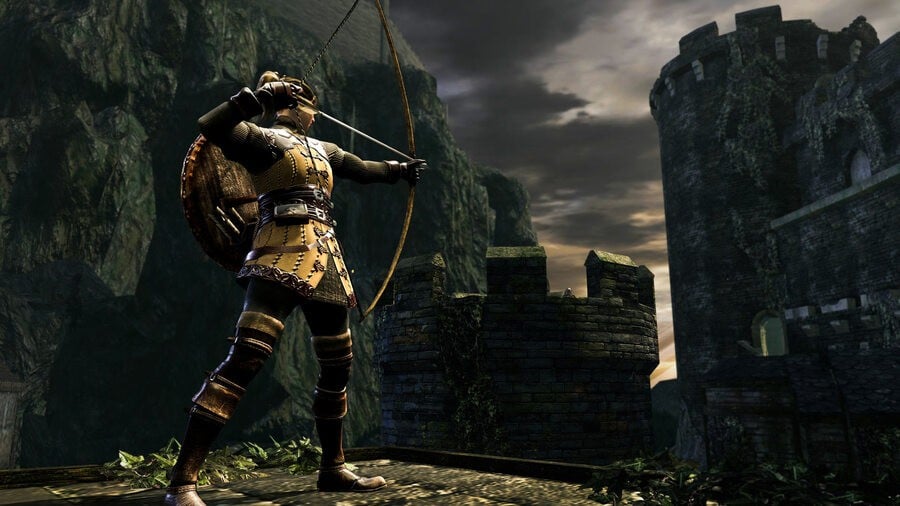
We've had to slog back through so many areas because we've forgotten this. Don't be like us.
Being hollow (undead) isn't necessarily bad
When you first start Dark Souls, you'll be hollow, which is basically the Souls term for being undead. You can reverse this state by using a single point of humanity (which you can pick up as a drop in various areas) and return to a human state.
But what does being a hollow or human actually mean? Well, while hollow you can't kindle bonfires or summon Solaire or a human player to assist you. While human, you can do both of those things, and you can invade other worlds to build up more humanity.
Put simply, we actually recommend that you spend the majority of the game as a hollow. That way you won't be rudely invaded by another player. Save your humanity though, and use it to kindle bonfires in particularly tough areas. This gives you double Estus Flasks (10) whenever you rest at that bonfire.
Also, it might be worth reversing your hollowing before fighting a particularly tough boss, as you can summon Solaire or another player to help you.
The stats are actually quite straightforward
We get it – seeing a wall of stats can actually feel just as intimidating as that boss you just got stomped by. Fortunately for you, the stats in Dark Souls aren't actually as obtuse as you first think.
Nor are they particularly important either. Aside from meeting the prerequisites for certain equipment, it's the equipment you choose to use itself that will often determine your success. That being said, here's what every single stat actually does:
| Stat | Purpose | Soft Cap | Hard Cap |
|---|---|---|---|
| Vitality | Increases your health | 30 | 50 |
| Attunement | Increases your number of attunement slots | - | 50 |
| Endurance | Increases your stamina, equipment load, and resistance to bleeding | - | 40 |
| Strength | Increases your weapon attack and ability to wield certain weapons | 20 | 40 |
| Dexterity | Increases your weapon attack and ability to wield certain weapons | 20 | 40 |
| Resistance | Increases your defence and resistance to poison | 15 | 30 |
| Intelligence | Increases your sorceries and magic weapons, and your ability to wield sorceries | 40 | 50 |
| Faith | Increases your miracles and divine weapons, and your ability to wield miracles | - | 50 |
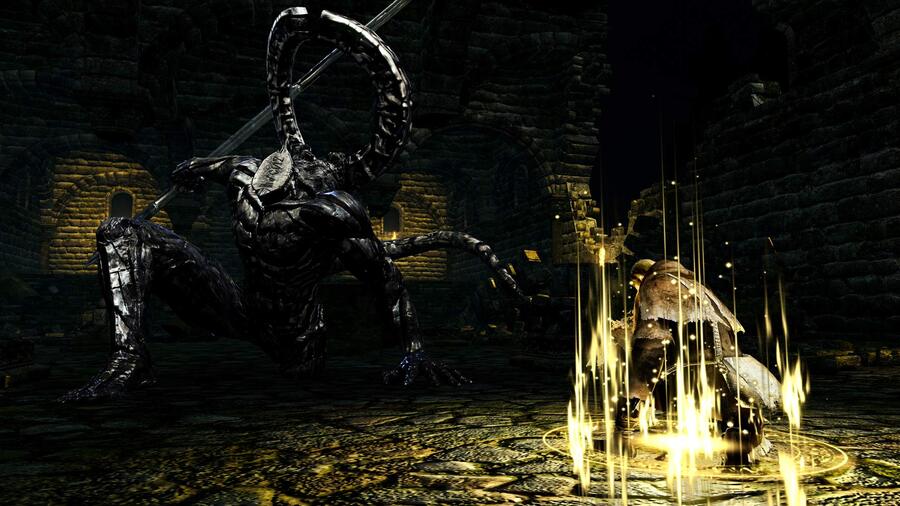
Try not to waste stats
While stats aren't the most important aspect of the game, we recommend learning about the soft and hard caps so you don't waste any precious points. When we talk about the caps, we mean the point at which you see diminishing, or no returns, from placing a stat point.
We'll go into this in more detail in another guide, but put simply, there's a point at which levelling up a stat is completely redundant. Take strength, for example. If you plan on wielding strength-based weapons, it's worth boosting this up to 40 and stopping there. That's the point at which you'll see very little difference from a point in strength.
Carrying on with this strength build, you'll probably want to bring dexterity up to 20 and then placing no further points. That's because the attack bonus from dexterity drops off slightly at the soft cap of 20, and you'll have enough dexterity to wield the powerful strength weapons in the game.
Be careful who you help – it might have consequences
Over the course of your adventure, you'll meet a bunch of NPCs that might ask for your help in return for a reward. Many of these NPCs are harmless, and will provide you with a nice reward upon your return to Firelink Shrine, but there are a few that can put a real downer on your day.
If you don't want to head to Google every time you meet a new character, we recommend that you just trust your judgement. If a character seems shady, leave them to rot. A good rule of thumb is that good characters will often detail the exact reward you're going to get for helping them, while shady ones will keep things vague.
Don't be afraid to use Titanite Shards
Once you've made it to the blacksmith in Undead Burg, you can start upgrading your equipment using Titanite Shards. You can find these lying around but the blacksmith also sells them to you for 800 souls a pop, so feel free to upgrade your favourite stuff to +5 maximum. At this point, you might want to hold off upgrading further until you've settled on your favourite gear.
You can also buy Large Titanite Shards, which are required for gear over +5, later in the game, so it's no biggie if you do want to upgrade something a little more at this point.
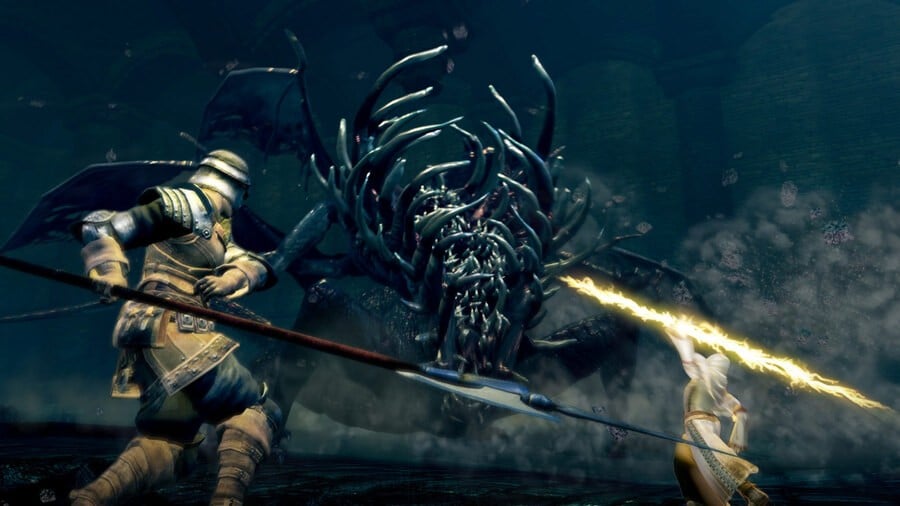
Hit all chests before opening them
Chests are always a welcome presence because, chances are, they contain something quite special inside. The only downside is, shortly into the game these chests can pose a bit of a danger.
Some of them aren't really chests at all, you see. They're horrific monsters that will swallow you whole and either kill you outright, or knock off a ton of your health. That's why we recommend hitting them with your weapon quickly first, as that way you can check to see if the chest is a monster or an actual chest.
Learn which souls you can (and can't) consume
As you explore Lordran, you'll pick up a wide variety of consumable souls. It's very important early on to learn which of these you should, and really shouldn't, consume.
For example, you should never consume a Fire Keeper soul. These are in very short supply, and are used to upgrade your Estus Flask. We'd also recommend not consuming a boss soul, as these typically unlock a special weapon you couldn't otherwise get.
A good rule of thumb is, if the soul sounds inconsequential (nameless soldier, knight, hero) then you can safely consume it. You can also take a look at the description for any clues as to what it might do. Boss souls usually remind you that you can use it to get a specific weapon, and Fire Keeper Souls let you know they're there for Estus Flask upgrading.





Comments 13
Coming fresh of Bloodborne, is this game more or less difficult? Just gotta know what to expect, I'll buy it anyway.
@Kidfried I'd argue it's more difficult than Bloodborne but it's also a different type of difficulty! Where Bloodborne is fast-paced and encourages aggression, Dark Souls is the direct opposite. It's more thoughtful and strategic, and might punish you if you try and play it like Bloodborne.
Both are absolutely fantastic games though, and you can't go wrong at all getting this. Just take your time and play it on its own terms.
@FoxyGlen Really interested how I'll fare in that case. 'Cause at times I felt like Bloodborne was too fast for me, but on the other hand I do dig the offensive approach to fighting.
Anyone who is interested in picking up Dark souls digitally should go get the 20% discount code for watching the countdown trailer for Detroit on the playstation live website. (sorry didnt know where else to let people know) at least in NA there is a code.
https://live.playstation.com
Bloodborne is definitely more my play style--fast, dodging, quick attacks (I will always be a rogue from my vanilla WoW + 7 years) and tend to build most my characters (when having a choice) in that game style. I've never been a fan of the clank & spank. I'm not opposed to getting this, but most likely when it drops in price. It's hard to pass on such a classic From Software.
Never got passed Ornstein and Smaough, did everything I could but nope wasn't happening.
I enjoyed the article apart from the hitting all chests section. You do not have to hit all chest incase of it being a mimic, what you can do is learn to tell the difference. A mimic chest if you look closely you can see it breathing and also the chain on the side curls towards the front and a normal chest it curls towards the back, one last thing to remember is that you can throw a Lloyds Talisman at a mimic chest to open them and take the loot with no risk of it attacking you
A few more:
Don't invest in Resistance - You can get gear to mitigate poison. You're always better off leveling your health or a stat that increases damage output.
If you want to try out weapons, go quality - A quality build means aiming for 40 strength and 40 dexterity. This gives you access to the widest variety of weapons as only a handful need faith or intelligence to wield. If you're not going into the game knowing exactly what you want to use, best to keep your options open!
Pyro is the way to go - Unlike in DS3, pyromancy requires ZERO stat leveling to increase damage (only a little attunement for slots). The game makes it seem like pyro damage scales with intelligence, but this isn't the case. As a result, a build focused on non-magical weapons can still use pyromancy for ranged damage and self-buffs.
@Kidfried You can build your character to play in a similar manner to Bloodborne. It won't quite be the same but you might find it a lot more comfortable.
I'd recommend picking a starting class that has a fast roll (Hunter, Thief, Wanderer) and start from there. Wanderer might be the best choice for a Bloodborne player – scimitar's a nice starter weapon too.
@SpacedTerror That's some great tips right there! Thanks man – I'll try and remember to update this on Monday.
@turntSNACO Good tips! Though I'd argue going 40 dex and str might leave you a little short for stats in other areas on a first run through, no? My rule of thumb is generally to pick a major stat and throw 40 into it, then put 20 into the secondary. That way you can still pop a ton of points into end and vit comfortably.
I agree that if you plan on going NG+, you should max the secondary stat eventually, but I think you'd be setting up a new player for failure by recommending they do it in their first run.
@FoxyGlen No problem. Anything to help out people with the souls games is always a pleasure
@FoxyGlen That's true. Maybe better to emphasize that Endurance is powerful and shouldn't be ignored. If you start by going toward 20/20 then choosing a stat to emphasize, that still covers the majority of weapons.
Tap here to load 13 comments
Leave A Comment
Hold on there, you need to login to post a comment...